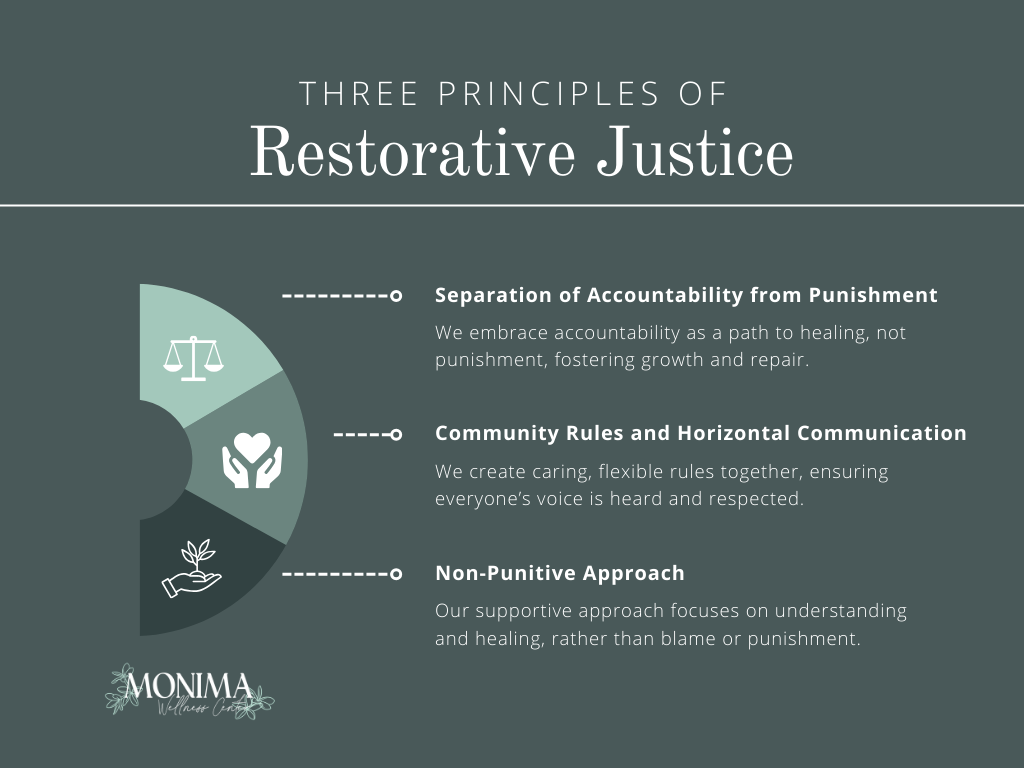- About Us
- Our Approach
- Women’s Services
- What We Treat
- Housing
- Blog
At Monima Wellness, we recognize that traditional punitive systems often exacerbate addiction and mental health issues, leaving individuals worse off than when they entered the system. In response, we embrace Restorative Justice (RJ) as an alternative paradigm that centers healing and reparation in the face of grievances between individuals, groups, systems, and communities. Our commitment to restorative justice is foundational to our approach, emphasizing storytelling, accountability, and survivor-centered healing pathways.

Restorative Justice (RJ) is an alternative philosophy and practice focused on acknowledging and repairing harm through collaborative, unique, and individualized approaches. Restorative justice seeks to build trust and community, ensuring that reparation can occur when harm inevitably happens. Unlike traditional punitive systems, RJ delineates accountability from punishment, providing a pathway for individuals to repair the damages that can arise in complex circumstances.
At Monima Wellness, restorative justice is integral to our communication within our whole community, including staff and clients. We believe in holding space for growth at every available opportunity, using RJ to move through challenges with the goal of healing and insight. Our approach to RJ emphasizes the following principles:
At Monima Wellness, we believe that effective healing and recovery require more than just addressing the symptoms of mental health and substance abuse issues. By integrating Restorative Justice principles into our treatment approach, we create an environment where clients can confront the root causes of their behaviors and take meaningful steps toward repairing the harm that has impacted the community. Our restorative justice approach emphasizes collaboration, community-building, and personalized pathways to healing, ensuring that a compassionate and understanding framework supports each client’s journey.

One of the core principles of RJ is the separation of accountability from punishment. Accountability for one’s actions is viewed as a pathway to repair and healing rather than a means to impose suffering. At Monima Wellness, we focus on understanding the complex situations that lead to harm and work collaboratively to create productive pathways forward.
RJ requires co-creating community rules that can be amended anytime to ensure horizontal communication and safety. This flexible approach allows for continuous improvement and adaptation to the community’s needs, fostering an environment where everyone feels heard and respected.
RJ does not seek to punish or find fault. Instead, it builds a comprehensive understanding of complex situations and seeks to create productive pathways forward from challenges. This approach aligns with our philosophy at Monima Wellness, which aims to support our clients in their recovery and well-being without fearing punishment.
Restorative practices are techniques used to engage people in the restorative justice process. These social interventions aim to build, improve, and repair relationships between individuals and communities. At Monima Wellness, we implement a variety of restorative practices to support our clients, including:
Ultimately, IPV encompasses a range of abusive behaviors that perpetrators use to exert power and control over their partners. These behaviors can occur in isolation or, more commonly, in combination, contributing to the complexity and severity of the abuse. Here are the primary forms of IPV:
Community-building circles are a foundational practice at Monima Wellness. They provide a safe space for individuals to share their stories, express their feelings, and build connections. By fostering a sense of community, these circles help create an environment where trust and mutual support can flourish.
Restorative conferencing is a structured process that brings together individuals affected by harm. This practice allows for open dialogue, where all parties can express their perspectives and work together to find solutions that promote healing and reparation. Restorative conferencing is particularly effective in addressing conflicts and building understanding between individuals.
Victim-offender dialogue or mediation is a restorative practice that facilitates direct communication between the person who has caused harm and the person who has been harmed. This process allows for the acknowledgment of harm, the expression of remorse, and the development of mutually agreed-upon steps to make amends. At Monima Wellness, we support our clients through this process, ensuring that it is conducted in a safe and supportive environment.
Implementing RJ at Monima Wellness profoundly impacts clients and the community. By focusing on healing and reparation, we create an environment where individuals feel supported in their journey toward recovery. We believe that RJ is not just a practice, but a way of being that permeates all aspects of our work. Trauma often takes away a persons agency; Restorative Justice seeks to empower all community members to impact change through their unique voice. Some of the advantages of our restorative justice approach in mental health treatment include:
Many experiences are viewed without underlying mental health and trauma considerations. Incarceration typically punishes the behavior without considering the factors that led to it. For many clients seeking treatment, this means their underlying mental health issues, trauma, and social circumstances remain unaddressed. Without appropriate treatment and support, these individuals are likely to continue using maladaptive behaviors.
Restorative justice, on the other hand, prioritizes understanding and treating the root causes of mental health and substance use issues. This approach involves comprehensive evaluations and tailored treatment plans that address the psychological, social, and biological factors contributing to challenging patterns of behavior.
Monima Wellness recognizes the multifaceted nature of mental health, trauma, and addiction and aims to provide holistic and effective patient-centered care that addresses root causes and supports comprehensive healing and wellness. Learn more about our approach.
Research shows that individuals with substance use disorders are more likely to re-enter treatment if root mental health issues and trauma are not addressed. Restorative justice seeks to break this cycle by providing those struggling with addiction, trauma, and other mental health conditions with the tools and support they need to achieve and maintain recovery and long-term wellness. Restorative justice helps individuals build healthier lives and reduces the likelihood of future offenses by focusing on rehabilitation rather than punishment.
Restorative justice encourages community members to take responsibility for their actions and understand the impact of their behavior on others. This process fosters a sense of accountability often lacking in the traditional systems.
This can be a powerful motivator for change for any individual seeking treatment. Restorative justice practices allow individuals to make amends and rebuild their lives positively. This approach has been shown to have a positive psychological impact, promoting personal growth and empowering individuals to make better choices.
One key element of restorative justice is the involvement of the community and victims in the healing process. Participants are encouraged to repair the harm they have caused, including making amends, providing restitution, and increasing client’s participation in the community rather than distancing them. This process helps restore the victim’s sense of justice and positively reintegrates the participants back into the community with enhanced understanding. This sense of community support and involvement can be crucial in the recovery journey.
The ultimate goal of restorative justice is to create long-term positive outcomes for all community members. By addressing the root causes of harmful interactions and providing appropriate treatment, restorative justice helps individuals achieve a deeper understanding and lasting recovery. This improves the experience in the transitional community and enhances a person’s ability to engage in future conflict with a restorative approach.
At Monima Wellness, we pride ourselves on offering a unique and transformative approach to mental health, trauma, and addiction treatment tailored specifically for women and female-identifying individuals. Our facility stands out for its commitment to integrating evidence-based practices with a deeply compassionate and individualized care model, ensuring that each client receives the personalized support they need to heal and thrive.
To further enhance our clients’ recovery experience, Monima Wellness has partnered with Ohana Recovery Residences. This partnership allows us to offer optional safe transitional housing for women in our outpatient programs. Women who choose to stay at Ohana Recovery Residences benefit from an immersive, supportive recovery environment surrounded by a like-minded female community.
Ohana Recovery Residences offers transitional housing exclusively for women seeking support on their path to healing. The setting at each Ohana location provides the surroundings, amenities, support, and philosophy that allow residents to turn their focus inward. Women from all over the globe come to Ohana to solidify their support system before returning home following treatment.
At Monima Wellness Center, we proudly support our clients as they navigate this compassionate and effective approach to justice. Focusing on rehabilitation and community restoration can create a safer and healthier society.
If you or a loved one is struggling with mental health or substance abuse issues, Monima Wellness is here to help. Our compassionate and experienced team is dedicated to providing the highest quality care, using restorative practices to promote healing and recovery. Contact us today to learn more about our services and how we can support you on your journey to wellness.

If you or a loved one is looking for outpatient treatment for trauma, mental health, or addiction in San Diego, contact Monima Wellness today. Our team of experts is here to guide you through the recovery experience with an individualized, compassionate, and comprehensive approach to treatment.